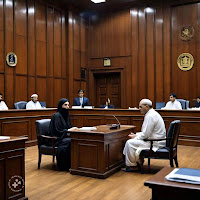Suit: Legal Process and Requirements
Understanding the legal process of filing a maintenance suit is crucial for anyone seeking financial support From her Husband incase of Divorce, Talaq, Khulah or separation. This guide provides a comprehensive overview, explaining how to file for maintenance Suit in the court and what requirements you need to meet.
Introduction
Filing for maintenance, also known as alimony or spousal support, is a legal process that ensures financial support for a spouse after Divorce, Talaq, Khulah or separation. This guide outlines the steps involved in filing a maintenance suit and what to expect during the legal proceedings.
Understanding Maintenance
Maintenance, in legal terms, generally refers to the financial support provided by one party to another, often arising in family law contexts such as Divorce, Talaq, Khulah or separation. It can include:
- Spousal Maintenance: Payments made by one spouse to another after divorce or separation, intended to support the recipient financially, especially if they were financially dependent during the marriage.
- Child Maintenance: Payments made by a non-custodial parent to the custodial parent for the financial support of their children. This is typically governed by specific guidelines or court orders to ensure children’s needs are met.
- Maintenance Orders: Court-issued directives that legally obligate one party to provide financial support to another. These orders specify the amount, duration, and frequency of payments.
- Modification of Maintenance: Adjustments made to maintenance payments due to changes in circumstances such as income, employment status, or the needs of the recipient or children.
Understanding maintenance involves navigating legal processes, court procedures, and often involves negotiation or litigation to determine fair and equitable support arrangements. Each jurisdiction may have specific laws and guidelines governing maintenance, aimed at ensuring financial stability and support for parties involved, especially in situations of familial change or upheaval.
Legal Grounds for Maintenance
Maintenance, also known as alimony or spousal support, is financial support provided by one spouse to the other during or after Divorce, Talaq, Khulah or separation. The legal grounds for maintenance typically vary based on the jurisdiction, but here are some common factors considered:
- Financial Need: The requesting spouse must demonstrate a financial need for support, often due to being economically dependent on the other spouse during the marriage.
- Ability to Pay: The spouse from whom maintenance is sought must have the financial capacity to provide support. This is typically assessed based on income, assets, and earning potential.
- Standard of Living During Marriage: Courts may consider the standard of living established during the marriage. The goal is often to enable the recipient spouse to maintain a lifestyle similar to what they enjoyed while married.
- Duration of Marriage: Longer marriages often result in higher potential for maintenance awards, as the financial interdependence is presumed to be greater.
- Age and Health: The age and health of both parties may be considered, particularly if it affects their ability to earn income or become financially independent.
- Child Custody and Support: If there are children involved, custody arrangements and child support obligations may also impact maintenance decisions.
- Contributions to the Marriage: Non-financial contributions to the marriage, such as homemaking and child-rearing, may also be taken into account.
- Other Factors: Depending on the jurisdiction, other factors such as fault in the breakup of the marriage, educational background, and potential for future employment may also influence maintenance awards.
It’s important to consult with a legal professional or attorney specializing in family law in your jurisdiction for specific advice, as laws can vary significantly from place to place.
Preparing for a Maintenance Suit
Preparation is crucial for a successful maintenance suit:
- Financial Documentation: Gather proof of income, expenses, and financial assets.
- Legal Counsel: Consult with a family law attorney specializing in maintenance cases.
- Supporting Evidence: Collect evidence supporting your financial situation and need for maintenance.
Filing the Maintenance Suit
Here’s a step-by-step guide to filing for maintenance:
- Petition for Maintenance: File a petition in the family court stating your need for financial support.
- Serve the Papers: Ensure the respondent is served with the maintenance petition and any supporting documents.
- Response from Respondent: The respondent can agree to the maintenance terms or contest them, providing their financial information.
- Preliminary Hearing: The court may schedule a preliminary hearing to discuss temporary maintenance while the case is ongoing.
Court Proceedings
Understanding court proceedings can alleviate some anxiety:
- Discovery: Both parties exchange financial information and other evidence relevant to the maintenance claim.
- Mediation (if applicable): The court may order mediation to reach a mutually agreeable maintenance settlement.
- Evidence Presentation: Both parties present evidence of their financial situations and needs.
- Witness Testimonies: Witnesses may testify regarding the financial circumstances of either party.
- Final Hearing: The judge reviews all evidence and makes a final determination regarding maintenance.
Factors Considered by the Court
Courts consider various factors when determining maintenance awards:
- Income and Assets: Each party’s income, assets, and financial obligations.
- Financial Contributions: Contributions made by each party during the marriage.
- Health and Age: The physical and emotional condition of each party.
- Childcare Responsibilities: The impact of childcare responsibilities on each party’s ability to work.
- Employability: The skills and employment opportunities available to each party.
Finalizing the Maintenance Order
Once a maintenance order is issued, it must be finalized:
- Maintenance Order: The court issues an order outlining the amount and duration of maintenance payments.
- Payment Schedule: The order specifies how and when maintenance payments are to be made.
- Enforcement: Non-compliance with maintenance orders can lead to legal consequences, such as wage garnishment or contempt of court charges.
Modifying Maintenance Orders
Maintenance orders can be modified under certain circumstances:
- Change in Financial Circumstances: A significant change in either party’s financial situation may warrant a modification.
- Cohabitation or Remarriage: Maintenance may end if the recipient remarries or begins cohabitating with a new partner.
- Agreement of Parties: Both parties can agree to modify the maintenance order without court intervention.
Legal Support and Resources
Seeking legal assistance is crucial during maintenance proceedings:
- Family Law Attorneys: Consult with an experienced attorney to navigate the complexities of maintenance law.
- Support Groups: Join support groups for emotional and practical support during this challenging time.
- Legal Aid: Explore options for legal aid and resources available in your jurisdiction.
Download Sample MS Word File For Suit for conjugal rights, recovery of maintenance allowance and separate shelter
view and Download ms word file for Suit for conjugal rights, recovery of maintenance allowance and separate shelter. enter the relevant details according to your case in the suit below before filing,
Conclusion
Filing a maintenance suit requires careful preparation and understanding of the legal process. By gathering necessary documentation, seeking legal counsel, and presenting compelling evidence, you can increase your chances of obtaining a fair maintenance award that meets your financial needs.
FAQs
1. How is maintenance different from child support?
Maintenance is financial support provided by one spouse to another after separation or divorce, while child support is payments made by a non-custodial parent for the financial care of their child.
2. How long does maintenance last?
The duration of maintenance payments varies depending on factors such as the length of the marriage, financial need, and court discretion.
3. Can I seek maintenance if I was not legally married?
In some jurisdictions, you may be eligible for maintenance-like support if you can prove a long-term relationship with financial dependence on the other party.
4. What happens if I stop receiving maintenance payments?
You can seek legal recourse through the court to enforce the maintenance order and ensure compliance.
5. Can maintenance orders be modified?
Yes, maintenance orders can be modified if there is a significant change in circumstances, such as loss of employment or health issues.

